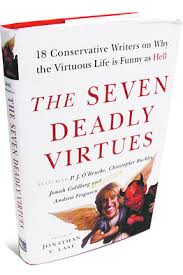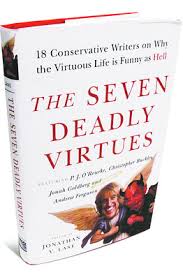 Jonathan V. Last, ed., The Seven Deadly Virtues: 18 Conservative Writers on Why the Virtuous Life Is Funny as Hell (West Conshohocken, PA: Templeton Press, 2014). Hardcover / Kindle
Jonathan V. Last, ed., The Seven Deadly Virtues: 18 Conservative Writers on Why the Virtuous Life Is Funny as Hell (West Conshohocken, PA: Templeton Press, 2014). Hardcover / Kindle
It is a vice to judge a book by its cover, but one that I’ll indulge in this instance. The book’s title and subtitle mislead. Its authors essay sixteen virtues, not seven (and none deadly), and while they do so hilariously, the funniness of the virtuous life is not the point of their essays. That said, The Seven Deadly Virtues is an insightful book, humorously written, and well worth reading.
The book divides into two sections. The first examines the traditional virtues, seven in number and divisible by two: prudence, justice, courage, and temperance are the cardinal virtues; faith, hope, and charity are the Christian virtues. The second looks into everyday virtues: chastity, simplicity, thrift, honesty, fellowship, forbearance, integrity, curiosity, and perseverance.
In the Introduction, Jonathan V. Last defines virtues as “the internal qualities that allow us to be our best selves and enable us to lead complete and fulfilling lives.” He warns against “extremism in the pursuit of virtue,” saying instead that virtue is “additive.” “No single virtue is sufficient in and of itself, and each one, taken on its own is corruptible. Yet each virtue becomes more valuable with the addition of others. And for any single virtue to be brought to its full bloom, it must be surrounded by its sisters.”
Picking favorites among the individual essays is difficult. How do you choose between P. J. O’Rourke and Christopher Buckley? Rob Long and Matt Labash? Andrew Ferguson and Jonah Goldberg? You don’t. You read, laugh, and learn.
Instead of picking a favorite, let me highlight Sonny Bunch, a younger, not-as-well-known author whose chapter, “Forbearance: Opting Out of the Politicized Life,” seems particularly apt for the politicized times in which we live.
The politicized life is “the growing, pernicious trend in American society where politics are injected into every moment of one’s existence.” For example, if you eat (or don’t) at Chick-Fil-A because you love (or hate) Truett Cathy’s support of traditional marriage rather than because of its delicious chicken sandwiches (not to mention peach shakes!), then you’re leading a politicized life.
Unfortunately, the Internet exacerbates the viciousness—in both senses—of politicization. “In real life,” Bunch points out, “you forbear those around you because you never know who thinks what, and forbearance makes it easier for the whole neighborhood to get along. There is diversity of thought, in part because no one really cares what the guy who lives next door thinks about marginal tax rates. But in virtual life, everyone in the self-selected group pretty much thinks the same way thing, about everything. And the occasional deviations become opportunities to enforce the communal norms, to show how super [serious] we all are about the righteousness of whichever cause binds the community together.” This politicized viciousness makes appearances on the social media of both the left and the right of the political spectrum, as both my Right and Left friends will quickly attest. (It’s easier to spot the lack of forbearance in those who differ from you online than in those who agree with you.)
Forbearance doesn’t mean avoiding politics, of course. (Avoidance isn’t possible, even apart from the ubiquity of social media, for the simple reason that politics is how we organize our common life, and you cannot avoid your neighbors.) Bunch writes: “there’s nothing wrong with standing up for your beliefs and attempting to persuade those with whom you disagree. But,” he goes on, “there’s a difference between having polite, rational discussions and declaring those with opposing views to be the enemy and, therefore, worthy of destruction, infamy, and impoverishment.” So, “the next time a Two Minutes Hate ramps up,” Bunch advises, “step away from your computer and get a cup of coffee. You’ll be a better person. And you’ll feel better too.” Yes, and amen!
If what Bunch has written resonates with the better angels of your nature, my guess is that you’ll both profit from and enjoy reading The Seven Deadly Virtues. Though written by conservatives (but not only for conservatives), the book contains insights that are widely applicable because appropriately wise.
P.S. If you found this review helpful, please vote “Yes” on my Amazon.com review page.

